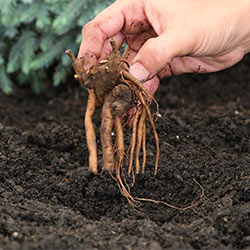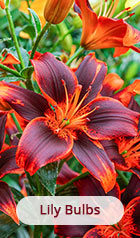General rose uses
Hybrid Teas and Grandifloras are upright
and well-branched, ideal for the back of
mixed perennial beds.
Floribundas are rounded and full, great
for providing season-long color on an
attractive landscape plant.
Climbers grow up to 20' tall and are ideal
for adding height and dramatic interest to
landscapes.
Shrubs
are hardy, trouble-free roses, great
in group plantings for providing easy landscape
color.
Ground Covers
can grow up to six feet in
width, and are ideal for slopes, rock gardens,
hanging baskets, and mixed containers.
Miniatures are usually less than three
feet in height, and are great as a mini
border, as accents or in containers.
Planting Roses (in the garden)
Soak roots for 1-4 hours before
planting. There are five basic steps for planting trees, shrubs and hedges:
- Choose a location that receives at least
six hours of direct sunlight each day
and ample space to allow plenty of air
circulation. Any sun-loving perennials
and annuals make great companions
for roses, as they can complement the
blossom color and plant shape, as well
as extend the bloom season.
- Before your roses arrive, prepare your
site. Roses thrive in well-drained soil
that is high in organic matter. To test
the drainage, dig a hole about 12"
deep and fill it with water. In welldrained
soil, the water will drain out
within 15 minutes. If the water drains
more slowly, amend the soil with
organic matter, such as pine bark,
peat moss, or compost.
- When your roses arrive, remove them
from their box and soak the roots in
a bucket of water for a least an hour
or two (but no more than 12 hours).
If you will not be planting right away,
cover the roots with damp newspaper
to keep them moist and store them
in a closed plastic bag in a cool,
sheltered area.
- To plant your roses, dig a hole at
least 12" deep and twice as wide as
the root ball. Build a small mound in
the center of your hole and spread
the roots out around it. The plant's
crown (where the roots meet the
canes) should be at ground level
for mild climates and 2-3" below
ground level for cold climates. Fill
the hole with amended soil. Water
again thoroughly.
- Top dress your rose plants with
mulch. This will help with water
retention and weed control, while
giving your roses a finished look.
Watering
Most roses require about
one inch of rainfall weekly during the
growing season. If you need to provide
supplemental irrigation, it is best to
do so in the morning to give the sun a
chance to dry out any moisture on the
foliage. When possible, hand water or
use drip irrigation to target the base of
the plant. Do not overhead water, as this
can encourage disease.
Fertilizers
You can begin feeding your
roses when new growth is about six inches
in length. For best results, spread the
fertilizer around the plant at the drip line.
Back to Planting Guides page
Have another question? Return to the Customer Service Help page or send an e-mail directly to Customer Service





















